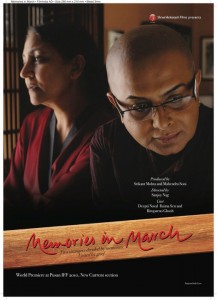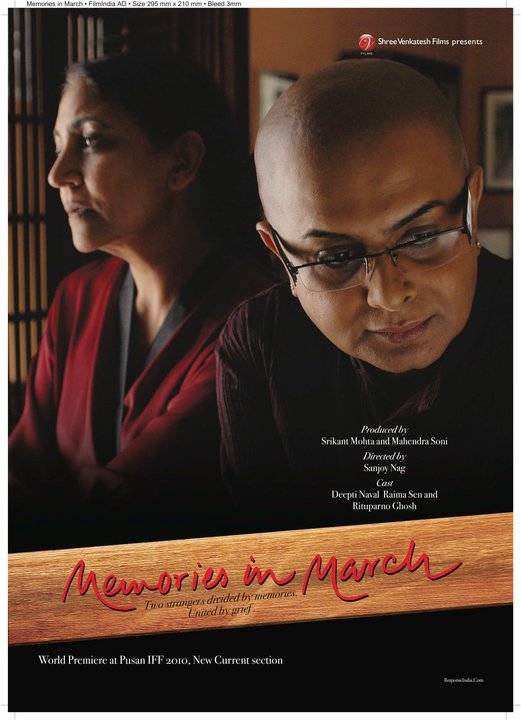by Yayaati Joshi
[box]A mother in denial, a ‘lover’ on an existential trial: Sanjoy Nag’s directorial debut discusses alternate sexuality in a way it isn’t usually discussed, says Yayaati Joshi in his monthly column, Film Freak.[/box]In a society where both gay right activists and homophobes thrive in equal proportions and intensity, it is hard to predict the degree of ambivalence that people might have towards the film. It is also futile to understand the intent of the filmmaker – regardless of whether the film was supposed to be another artistic feather in Deepti Naval’s cap or an experiment in filmmaking, the result (in the form of a feature film) is all we have to discern.
The premise is poignant but in an unconventional way. A mother loses her son. But the loss of the son is soon overcome, not by the usual ‘life  moves on’ ideology, but by something more befuddling. The theme of the film could be summed up in one (somewhat rhetorical) question – ‘How would you react if you found out that your dead son was homosexual?’ Those who’d like to answer the question by saying “So what?” should be reminded that for many people, regardless of their culture, homosexuality is still taboo. Deepti Naval answers that question with a variety of confused emotions: with disgust, with shock and even with indifference (for the death of the son is too gloomy to shift the focus to something else). But, for a major part of the film, she answers the question with denial.
moves on’ ideology, but by something more befuddling. The theme of the film could be summed up in one (somewhat rhetorical) question – ‘How would you react if you found out that your dead son was homosexual?’ Those who’d like to answer the question by saying “So what?” should be reminded that for many people, regardless of their culture, homosexuality is still taboo. Deepti Naval answers that question with a variety of confused emotions: with disgust, with shock and even with indifference (for the death of the son is too gloomy to shift the focus to something else). But, for a major part of the film, she answers the question with denial.
It is heartening to see her maintain her composure as she denies the fact about her son’s sexuality, the characteristic of the powerful urban mother who has learnt to master her emotions. All the same, I watched in awe as she is shattered to learn that her son indeed had a romantic affair with a man. This is not the ignorance of the middle class mother (many of whom are actually unaware that such relationships are becoming common now). Rather, this inability to keep a straight face is the confusion of the unprepared mother. To my mind, Deepti Naval’s stance was that of the unsuspecting fisherman, who had heard and was thus aware of storms, but largely due to the storm’s hitherto absence in his life, he is unable to react when his boats have been destroyed by it. So great is her denial that when she finds a pack of prophylactics in the deceased son’s house her ‘faith’ is renewed. She immediately calls a female friend to confront her as if the evidence of the false charge has been found; her son was not what he was alleged to be. But her hope is not meant to last long. The female friend (Raima Sen) rebuffs her so causally that she is unable to find a counter-argument. This scene, a powerful one, does more justice to Naval’s role than the quiet moments in which she remembers her son and sobs. On one hand is the causal ‘Who cares’ attitude of a generation that grew up amongst homosexuals and on the other is careworn bafflement of the mother who is not sure which to mourn more – her son’s death or the knowledge of his same gender assignations. Without leaning too much in either direction, of regret, or of astonishment, Naval strikes a fine balance as a sad mother.
There are layers to Naval’s confusion. It’s not just the uni-dimensional conundrum that worries her. The fact that an important aspect of her son’s life was not known to her puzzles her too. As the film progresses and she becomes acquainted with her son’s ‘lover,’ the memories of her son haunt her revealing to us that he used to be a woman’s man, thereby compounding the mother’s trouble. The lover (Rituparno Ghosh) confronts her to make her realise that one way or the other, she has to accept the ‘fact’. Although by the end of the movie the mother has warmed up to her son’s partner, it is with supreme suspicion that I see this acceptance. This suspicion is not my jaded mind telling me that it is hard to get convinced; this is the film making a finer point about how even a broad minded, urban parent is likely to react to a situation like that.
On seeing this film, one can make a very strange and tenuous connection with another film, Encounter: The Killing, in which a family refuses to acknowledge the son’s identity on finding out that he was a criminal. In that film too, the deceased’s parents are rich, modern and uppity. Yet for all their modernity, I guess when it comes to their own children, parents are less likely to liberal. For example, the same people who watch reality television/movies and all its vulgarity with interest might not like it if their sons and daughters ape the behaviour which is classified as ‘modern.’ Although I am not a parent, I guess I might possibly react in the same way.
Any takeaways? Just one word – hypocrisy.
Film Freak is an exclusive monthly column by Yayaati Joshi, who, well, is a film freak. It features movie reviews and essays on various aspects of Indian and world cinema.
Yayaati Joshi is a man with simple tastes and intense beliefs. Contrary to the bling associated with the capital city, he prefers the company of close friends, an engaging book or an Alfred Hitchcock movie. His placid demeanour is often mistaken for reticence; Yayaati is a self- proclaimed loner, whose recent pursuits include his foray as a budding writer. Yayaati blogs at http://rantingsofadelusionalmind.wordpress.com
[facebook]Share[/facebook] [retweet]Tweet[/retweet]





